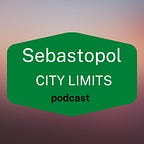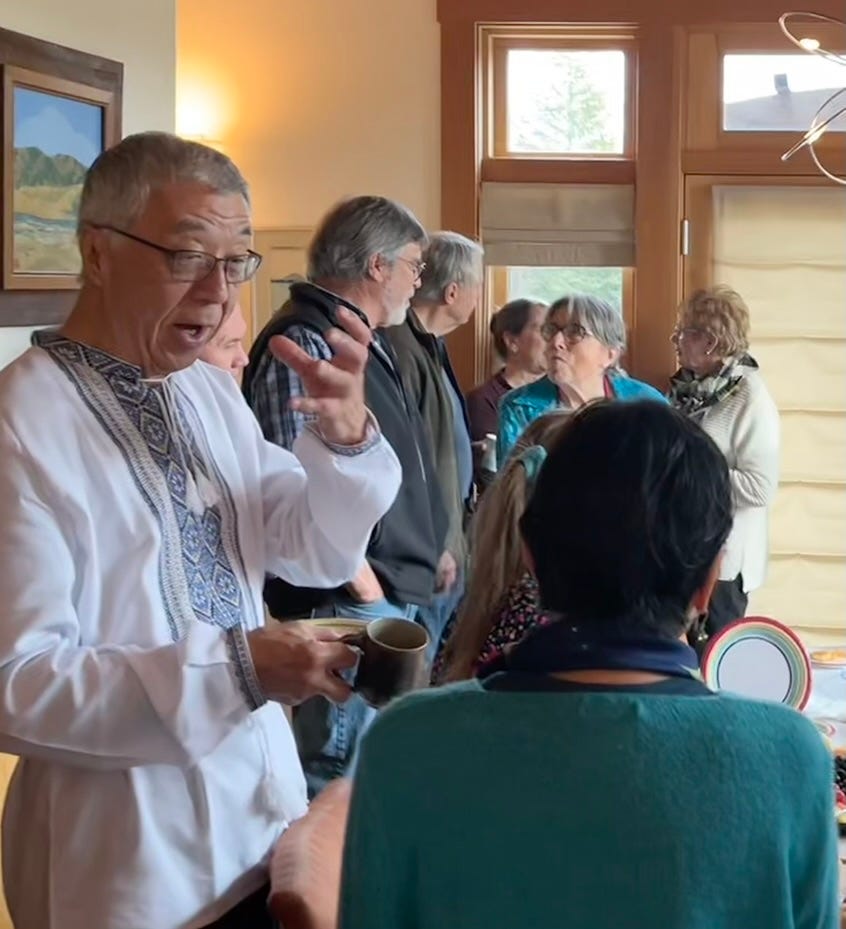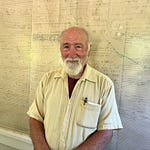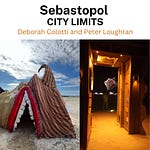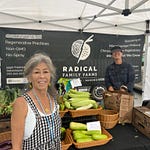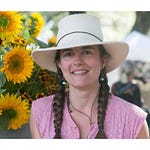This episode, a conversation with David Mark-Raymond, covers a lot of ground. It’s about community service and the way that individuals get involved in service clubs like Rotary to do things locally and internationally. It’s about David’s personal story; he was once a teacher and then a realtor; he’s been a longtime member of Sunrise Rotary; and a few years ago, he was diagnosed with cancer and beat the odds, which led him to retire and focus even more on community service.
It’s also about how a small circle of folks including David who helped bring two Ukrainian refugee families from Germany to homes in Sonoma County. So, consider this a conversation about the ways that people like David, along with many others, accomplish a lot by working together in and for our community.
David and his wife, Susan, are members of the Lone Pine Ukrainian Family Aid (LPUFA) group, led by John Namkung (I interviewed John last Fall). LPUFA also includes Gina Blaber, Gary Moe and Betty Beavers.
The two friends, both named Iryna, lived in Chernihiv in the Ukraine, which is close to the border with Russia. After living as a refugees in Germany, they moved to Sonoma County last year with their families.
Transcript
Dale: I'm joined on this episode by David Mark Raymond. David, I hope we're gonna talk about community service. David is a leader in this in my view, and has lots of experience in the Rotary and different groups. So we're gonna dive into that today. But first of all, welcome David.
David: Thank you very much. Nice to see you Dale.
Dale: Nice to have you here. So give me a bit of, what's your background and work history. How would you describe yourself?
David: Yeah, as an interesting character, yes, I do keep on ending up in leadership roles, but I'm only one of many. So my background might help to set the context for who I am.
I was raised in the army. My parents who were both disabled in World War II, they ended up with injuries that continued and were eventually a hundred percent service connected disability from their experiences. One in the Pacific, the other in in Europe, and they met in rehab at the end of the war, and everybody was getting married. They did too. Then these poor unfortunates went on to have four children.
It was a difficult upbringing. As my dad was fortunate they kept him in the army, which is a whole story in and of itself. But they both continue. My father's injuries were mostly psychological. My mother's were both psychological and physical. And so it prepared me for people who are different, people who have to find their own way through lives and it's not given them and work and believing that everybody has value.
So it set the context for the rest of my life.
Dale: My, and where was that physically? What location were you?
David: First in Seattle, Washington at a small military base there then in Fort Belvoir in Virginia, which placed us close to Walter Reed Army Hospital because my dad would periodically need to be Hospitalized for his depression.
So he would go in and they would patch him back together again, put him back out and wind him up and he'd go again. And that was how it all happened. I realized early on that I was not in a normal family. And as every family takes on a different role, mine appeared to be caregiver and steering and helping us to be as integrated with the community as we could be.
I started off as a volunteer working with individuals who had handicapping conditions developmental disabilities, mental retardation, cerebral policy, epilepsy, autism. So as a teenager I did that with a volunteer group, and that was my social group, were the folk that I had collected and helped to organize around integrating folk with special needs into the world. And a humble brag, as there was nobody around who wanted as an adult to work with that population, or not very many people-- there were more remunerative things to do-- I gave up my idea of being a school teacher and began working with folk with special needs as things went along.
Very quickly I became a director and an administrator, and then ran a series of nonprofits and taught in them and worked in them for the Junior College, for private concerns. And I just made a career outta running those things. I was an executive director and really enjoyed that, probably 20 years.
Dale: In this area?
David: Yes. In Sonoma County for the most part, a little bit in Vermont. Then at one point I had always wanted to be a school teacher. And so when I was turning 40, I realized, gosh, if I don't do it now, I never will.
I had led progressively larger organizations. My last one I employed, I don't know, 125 people. And wanted to do something else so, I got a teaching credential. Taught sixth one year full-time. And that was all I did full-time. And then I taught kindergarten at Apple Blossom School in Sebastopol, two days a week and opened up a real estate practice which went on for the next, I don't know, 26, 27 years now.
Real estate is essentially done -- it's social work with income. So I was able to support my family. I was very fortunate and that went really well for me.
During that time, I continued to do a variety of things. In fact, I think when I first met you, I was president of a group that formed an educational foundation and was benefiting the basketball city schools. And I continued to keep my hand in doing things consulting, but I taught and because that wasn't going to be a long-term thing, real estate really took over for me.
Dale: Over the last year or so you retired. Is that right?
David: Some people won't see this as a blessing, but in reality it is. Having been raised under very modest circumstances, neither of my parents graduated from high school. I was the first person in my family to go to college, much less graduate from it. I got a master's degree in business from McLaren School of Business that augmented the work that I did as an administrator and helped me to be effective.
In 2019, I had the good fortune of getting diagnosed with cancer. I had lymphoma and went for the standard treatment. And unfortunately the standard treatment was not effective for my particular cancer. Lymphoma's an umbrella and everybody's version of it is different. Mine was fast, aggressive, and I was told to, let's just say I, I was told to put my affairs in order because very few who had my characteristics would make it.
Eventually they sent me to Stanford and put me through things that you don't want to hear about. But I got a lot of rounds of chemotherapy and ended up with a stem cell transplant. While I am down there at Stanford, I start thinking about my life, wouldn't one? And and I did have one big regret.
I wasn't upset about the cancer so much. I was afraid that I had over saved from my retirement cuz I'm frugal and I worked hard and I saved money. I'm like, Hey, I'm not gonna get to use this. Great, Susan will get to use it. Susan's my wife. But maybe that wasn't gonna turn out so well and I really had to stop for the first time in my life, I had enough time to really stop, back up and think about what's important to me.
And I realized that while I enjoyed working and it was great, I didn't need to anymore. I kept working because I always need something to do. I'm sort of a restless fellow. And I thought, so if you don't need the money, but you're still working and you still wanna work, how about if you work for free?
Why don't you reverse? So I had been involved with Rotary since 1997 and here we are 23 years later. I've been involved with Rotary. I'm doing other things, projects all the time, and I love that. And I said, why don't you just reverse.
I still am licensed to sell real estate, but I don't actually do it. I consult, so I help people with problem properties. General planning about should they buy, should they sell, should they help their kids? How will that all work? What does it line up like? Lot lines, septic systems, all the things of country properties and in town , and people in other places, but consulting is highly efficient. So I talk with them. Then I get somebody else who's going to actually write the contracts, sign things, put people in the cars, take them places, show them, counsel them, and do things like that. And I sit on the side available. I still have useful knowledge. So it's worked out quite well.
That amounts to a little bit less than the amount of time that I used to spend on service to the community. So now I full-time pretty much work for Rotary, work for other service organizations and attempt to organize good things in our community because why would I not wanna do that?
I work about as much as I did. It's not like I don't have a personal life. I do. But and always did, but this is working great for me.
Dale: All right. So I wanted to dive into the kind of things you're doing. For someone who doesn't know Rotary, tell us about it. Why do you belong? What do you do? What's the overall goal of it?
David: I joined it because I wanted an organized way that I could work in the community and do good things with a ready-made set of people. In the past, I used to pull people together and others would too, or I would join their ideas. But I joined Rotary thinking that I was going to have a bunch of people that I could entice to do good things.
Actually it's turned out quite well. I've joined Rotary and they lead me to a lot of wonderful things I never contemplated would be possible for me.
Rotary was founded in 1906 by a fellow named Paul Harris, who was looking for basically a circle of friends to connect with. He was a Vermont grown and bred fellow who became an attorney in Chicago and was not really enjoying his life there. So he built a little network of people and they started working together. Before 10 years were out, the idea caught fire and they not only were all over the United States, but in many other countries in the world. Rotary currently is about 1.4 million people worldwide; some clubs as small as six and some clubs as big as 300. They're all over the United States, pretty much well in more countries than actually participate in the UN currently. So that's how big it is. Rotary is neat because it's all volunteer with a very few, very thin paid staff in Evanston, Illinois, and a couple of other headquarters throughout the world.
But we do projects together internationally. We do projects together locally. We put money into a large foundation both in terms of immediate money to use for disaster relief, to use for projects in areas of focus. Someone can go to rotary.org and have a peak at the sorts of things that Rotary does. I think they would be inspired. It really juiced me and got me going on things that I didn't realize were gonna be possible for me.
Dale: Interesting. Practically speaking, in Sebastopol, aren't there two different rotary groups?
David: There are. There's the older club meets on Fridays at noon. I had been invited to join it lots of times, but I would not join it because, and I used to go there when I ran nonprofits to get them to help me with things. And they were beautiful. I met with all of the service clubs, the Lions, the Kiwanis, all of them during those times. So that club had reached the point where it was so large that they felt it was unwieldy and they felt an opportunity might be there to start a club that would meet at another time of day on a different day.
So in 1997 a fellow named Bruce Campbell got the got the okay to splinter off a little bit of that club and start a new one with new members. When I heard that they were gonna meet on Wednesday morning, 7:30, that's much more like me. I can't go to lunch on Friday and then expect to work afterwards. I joined that club and have been a member ever since.
Dale: That's Sunrise.
David: That's the Sunrise Rotary.
Dale: You've been involved with John Namkung, who I've interviewed and I'll link to an interview with John, who's a fascinating person as well, helping to bring Ukrainian families to the area and settle them here.
Can you talk about that?
David: I think people should look at that link. It's wonderful. But John is a fellow that I've known for many years and he reached out to his circle of friends after he had seen online the beginning of the devastation in Ukraine.
He decided he was going to go there; he was gonna volunteer and he was going to help people who had gotten to the Ukrainian border shuttle into Poland and get onto other destinations, allowing them to be refugees. And the story of how that evolves to a Ukrainian family being here has everything to do with John and is too great a story to summarize here.
John, with one of the families that he met there, he realized that they were in need of different housing than they could find in Europe. Most of Europe, there was no room there. People are in dorms and all sorts of places. It's wonderful what Europe has done, but he felt, and I agree, that there's an opportunity for the United States to also help in those regards.
This is everybody's problem. So he started talking with folks and he came around to my Rotary club and targeted me specifically because I do a lot of organizing for Rotary. He reached out to uh-- he was an administrator in Education. By profession. So he reached out to my wife and all of those retired social workers and psychologists and teachers that he had worked with when he ran the special education local area plan here in Sonoma County called the SELPA. It helps out with special education in all districts. He reached out to me and to others and said, do you think we can do this?
Folks started meeting about it and said, maybe. That's a little scary. And we set a goal for ourselves that we needed enough money to be able to sustain a family, I think it was, three months and then we would fundraise and take chances. But this was failure is not an option, sort of proposition. How would that be if we brought them here and found out we couldn't really quite fundraise and then said to them Hey folks sorry, we can't keep you. But we had some lucky strokes.
My older brother has a condition that has required that he be in a long-term care placement. And that opened up his house. We were able to secure his house at a very attractive rate and we could commit to two years. That is the length of time that one's gonna stay. So the family came under a refugee program that was opened by the Biden administration and it is called United States for Ukraine. It permitted sponsorship and also some good provisions.
So John continues to be at the helm of our organization and and we've done a variety of fundraisers. I was able to reach out through Rotary and got support from eight clubs, basically paying that modest rent and all the utilities. A Rotarian gave them a car and a local shop agreed to do all the maintenance that would be required.
And folk have helped in all sorts of ways, getting that house ready helping them to integrate into schools. And it's, there is a nonprofit associated, but we're just a loose little organization of people that figure out ways to make it tenable for this family.
Dale: And originally the mother couldn't drive, didn't have a license and had not driven and you had people coming to take her and her children or to school or to shopping or whatever. She's managed to get her license and and and is doing well.
David: And has work.
Dale: Yes. And she has work now. But that integration is, it's a longer term commitment than just bringing someone here and saying, you've got a house.
David: It's schools. It's English as a second language. It's services for all of the supports that are needed to establish a family here.
There were a lot of different helps needed, and by the way, late breaking news. So this is a family -- the father, husband is in Ukraine and is part of the civil defense there. So this is grandmother, his mother and then a mother and two daughters, one in middle school, one in elementary school. They arrived here with the middle school daughter having some useful English. But that was all, and they have been doing amazingly, and that's due in large support to the school psychologists who helped, a large contingent of folk who are willing to do a variety of things and respond.
We developed a list of folk who said, yeah, you can reach out to me and if I can help, I will. And that evolved. So the service Rotary helped out, the Lions organization, another brand of service club, as wonderful organization, if there was no rotary in town, I wouldn't start a Rotary. I would join the Lions or the KIwanis or the others. And it continues to this day.
There was another family. Actually the first family knew this family. They were from the same town, 20 miles from the border with Russia and overrun in the first couple of weeks of the war.
This family was living in a studio in Germany, and employment wasn't possible and they there was no kitchen in the place they lived. And it was problematic. Just let me say that. Problematic. So they said, Hey, what do you think? Can you guys sponsor this second family?
Just having raised and done all the things we did, we went, oh, that's scary. Only if we can find a discounted or free rent. Let's reach out. And you yourself, Dale responded with a place to live. And a lot of support. And you actually became the sponsor for this family, you and Nancy. Lovely that you did that. Yeah. We call 'em the two
Dale: possible, the two arenas. Originally they were calls and they're best friends. They knew each other. They're from Char I think you say it, in the Ukraine. This second family, the husband was with them. They have two boys, one who's now at Anally and one who's at Parkside. The the older boy speaks English pretty well.
David: Yes he does.
Dale: The other three are learning English as they go. I wanna come back to John because John has the kind of patience and diligence that is necessary to push a lot of this along. He figures out how to take care of what organizations they need to connect to for medical, for going to DMV and getting licenses, all these kinds of things. And he's certainly applied the things that he learned with the first family to the second family.
John has done a remarkable job and you and others have been such a big support behind him. It's ongoing and that's what I find impressive. It's easy to give money sometimes and walk away and go on to your life, but you guys are meeting every other week to discuss the family's needs and how to meet them and how to help them here. And it will take a long time for them to integrate. But I think it's remarkable what you're doing.
David: I think it's remarkable too, and they are entirely worth it. They're wonderful people. Very intelligent, very caring, very grateful and people who are worthy of support - certainly everybody's worthy. But yeah, these two families are just wonderful. And they're as self-sufficient as they can be.
Dale: I wanna point out that there are other Ukrainian families in Sonoma County. David and I had a version of this conversation at my house a couple weeks ago where we brought them together about 30 people or so. But there's a set of twins and their father living here and there's another group Sebastopol World Friends that has been involved, and a lot of different folks.
David: There are two families in Sebastopol, two families in Santa Rosa and one family in Cloverdale, a family in St. Helena. Each is making their way in different ways. I can say that the small ad hoc group is a little bit different format than you typically would see most of the others. It was an individual with substance who said, I can open a house for you and I can do these things.
Yesterday our group had a meeting as we do regularly to, to process and see how everything's doing. And Dale , you might enjoy that I shared at that meeting that when I grow up I wanna be more like John because he is very organized. He uses the skills that he used to run a very large organization at SELPA, and he uses them well to marshal this group.
He's doing things that he's never done before. He's never been a fundraiser. But golf tournament, concert , direct solicitations. This week, they will be meeting with Nina Gerber at the studio where she's going to record a Ukrainian anthem and the local Ukrainian families are going to be singing her backup. And they're good singers. It's gonna be lovely. I think it's going on an album.
Dale: One other thing that caught my eye in January, the Biden administration announced the Welcome Corps. It was a program in which I'm quoting from New York Times as "private citizens will now also take on logistic and financial responsibility for helping thousands of refugees transition to life in the United States."
And it's a kind of a new approach for the government to take, but I remember talking to John when I read the article saying, John, you're already doing this. And John's someone who's been involved with refugee nonprofit organizations and he said to me, this is, yeah, this citizen effort is a very different thing.
And I think it's really important. And one of the reasons why I wanted to talk to you today was just to tell people more about this. It's this feeling that there's a lot more we can do. But like you say with Rotary, if you have to do it all by yourself, it's really hard. If you can find other people and organize together and do it incrementally, you can really do things that others just can't do.
David: I hearken back to Dwight Eisenhower. And what Dwight Eisenhower said to the American people, he said, the government will never be enough. And I agree with that. The government will do what it can and should do what it can to ensure health and safety of all of us and do what it can to make our world a better place. But it's never gonna do it all.
This is our opportunity to do this and this isn't new. The Afghan crisis that is just a few years back. Some of those Afghanis, eight families that I'm aware of are in Sonoma County and finding their own way too. But this is interesting that the government would say, Yes, do this and you can sponsor, but our government is also doing something else that I think is pretty exciting.
They opened up opportunities for us to secure aid to families with dependent children. Uh, Is a boon in terms of economics. They give a small modicum and then these folk don't end up really on the public dole. When you get aid to families with dependent children here in California, that qualifies you for CalFresh and that also qualifies you for Medi-Cal. The big, most expensive items are taken care of, if you can take care of some of the other things, that public-private partnership is most effective.
Now, our family is here on a two-year visa. It's a refugee visa. I do not know what will happen next.
Dale: Many of them fled the Ukraine thinking this is a short war. This problem would be over in weeks, months. We're coming on the, one year anniversary of the Ukraine war. They don't know when they'll be able to go back if they choose to do so. This, at least feels to them, a lot more secure and a place to raise their kids safely.
David: Close to 4 million people at this point have fled Ukraine and dispersed to wherever they could go. There wasn't a lot of, there weren't a lot of vacant rooms there already. So I think it's lovely that Americans are participating and let's remember that America is, has always been, a land of immigrants.
Dale: Okay. David. Thank you so much today for talking to me and sharing your own personal story, but also the ways that community service happens through local clubs and even small groups like John's. I think it's very important that people understand this is available for them to participate. But thank you again for your work.
David: One more thing.
Something that is adventing for your listeners who are in Sebastopol that might be interested. Very often service clubs like Rotary and Lions and Kiwanis and VFW, the Active 20-30s clubs, Masons-- we've kept in our silos, competing fundraisers, competing for volunteers to join us. And in the last two years, we came to the table with each other, made it a round table with support in large part from Diana Rich and some other folk at the city to talk and say different organizations have their purpose. Different organizations are mostly brands. And if we work together, we can be effective and do more things. So the current work is to channel service, not necessarily by saying, Hey, come join our club, or that club, or this club, or that. But to rather say, service organizations are relevant and make things happen in our community.
They're well connected. I'm sure everybody in your audience knows several people who are involved with any given organization. So we are looking now to eventually evolve our membership but more importantly to involve people in volunteerism of a great variety of sorts. There are opportunities for local work, for international work. And if you're interested in service, then all of those service organizations are basically an app to help you integrate in the community, connect your business to others who are high minded and well connected, or to work on in retirement, whatever you like. You don't have to join, you can just do things with us.
Dale: That's great. Okay. Thank you David, and appreciate your time today.
David: Thank you, Dale. I'm glad to spend it with you.

